Off-Label Antipsychotic Use Among Children Soaring
Researchers from Philadelphia and Baltimore find, in a study of Medicaid records for 50 states and the District of Columbia, that antipsychotic prescribing to...
Australia Plans To Screen 3 Year Olds For Mental Illness
A controversial move by the Australian Federal Government plans to screen 3 year olds for early signs of mental illness as part of routine...
“What if the Central Premise of Bipolar Disorder Is Wrong?”
"Always appending disorder to the word bipolar is akin to always appending accident to the end of automobile. In other words, saying 'bipolar disorder'...
“How Poverty Affects Children’s Brains”
New research is investigating how “poverty reduction promotes cognitive and brain development.”
Study Explores Sexual and Intimate Partner Violence in College Women with Disabilities
A new study explores sexual violence and intimate partner violence in college women with mental health related disabilities.
Study Connects Environmental Risk Factors and Psychosis
A meta-analysis of known risk factors for psychosis finds elevated risk with the presence of childhood trauma, adverse life events, and affective dysfunction.
Out-of-home Placements for Children Increase Odds of Psychiatric Issues
When controlling for social and family characteristics, separating children from parents into out-of-home care increases psychiatric issues, prescriptions, and criminal activity.
Pressuring Parents to Drug Children
Jim Gottstein on Pressuring Parents to Drug Children
J&J Settles With Montana for $5.9M in Risperdal Marketing Lawsuit
Subsidiaries of Johnson & Johnson have agreed to pay $5.9 million to settle Montana's lawsuit over the company's fraudulent marketing of Risperdal. According to...
Prozac Preschool
From Pacific Standard: Young children are increasingly being prescribed psychiatric drugs. However, there is very little research on the safety and efficacy of psychotropic drugs...
Can Children Have Bipolar Disorder?
After seeing the family for two sessions I came to the conclusion that what Adam was suffering from was inconsistent discipline, temper tantrums and misbehavior that were inadvertently encouraged by his parents. The correct prescription for Adam was not an antipsychotic medication that might cause him harm, but family therapy to help the parents implement a behavioral program that would fit Adam’s needs.
Valproate Linked to Decreased Brain Volume in Children Diagnosed with Bipolar Disorder
Researchers find that valproate decreases brain volume in a region associated with emotion processing across all participants.
“Children Today Suffer From a Deficit of Play”
Boston College Psychologist Peter Gray writes for Aeon about the impact of the gradual erosion of children’s’ play in the United States. “Over the...
Anticonvulsant Implicated in Birth Defects in up to 4,100 Children, French Study Finds
Between 2,150 and 4,100 children suffered from severe malformations connected to valproate prescription.
“Why Are So Many Children on Antipsychotic Drugs?”
“Do they make people less aggressive? Yes, sometimes they do. Will they sedate people? Absolutely. Will they make kids easier to manage? They will,” Robert Whitaker tells Liz Spikol for Philadelphia Magazine. “But I know of no study that shows that medicating these kids long-term will help them grow up and thrive. The developing brain is a very delicate thing. The narrative is that these side effects are mild, and that’s just not true, and that the benefits are well-established, and so often they’re not.”
Will Disruptive Mood Dysregulation Disorder (DMDD) Reduce False Diagnosis of Bipolar Disorder in Children?
Neuroskeptic takes on a new paper that proposes a new DSM-5's diagnosis will reduce the epidemic of bipolar diagnosis in children, comparing it to fighting...
Madness Radio: Sharna Olfman on Medicating Children Diagnosed Bipolar
Professor Sharna Olfman has researched and written extensively about children in society, including education and sexuality, and her perspective on so-called bipolar disorder is...
Labels Initiates Core Social Support, Lose Peripheral Ties
Article Abstract:
Although research supports the stigma and labeling perspective, empirical evidence also indicates that a social safety net remains intact for those with mental...
Omega-3 Screening for Psychiatric Symptoms?
There is a substantial body of evidence suggesting that not getting enough omega-3 fatty acids in your diet may be connected to a diverse array of psychiatric symptoms. In a new study published this month, psychiatrist Robert McNamara and Erik Messamore provide an overview of the evidence and call for screening of omega-3 deficiency in people experiencing symptoms associated with ADHD, depression, mood disorders, and psychosis.
“Biologism in Psychiatry: A Young Man’s Experience of Being Diagnosed with ‘Pediatric Bipolar Disorder'”
The Journal of Clinical Medicine explores pediatric bipolar disorder through the eyes a young American, whose story "reveals several issues that afflict contemporary psychiatry, particularly in...
Antidepressants Associated with Increased Risk for Manic Symptoms
An analysis of medical records in the UK reveals that the use of certain antidepressants for depression is linked to a heightened risk for mania and bipolar disorder. The research, published this week in BMJ Open, found the strongest effect for serotonin reuptake inhibitors (SSRIs) and the antidepressant venlafaxine.
Making the Case Against Antidepressants in Parliament
On Wednesday, May 11, there will be an inquiry by a work group in the U.K.’s Parliament into whether increases in the prescribing of antidepressants are fueling a marked increase in disability due to anxiety and depression in the U.K. I wrote about a similar rise in disability in the United States in Anatomy of an Epidemic, and the All Party Group for Prescribed Drug Dependence, which is the Parliamentary group that organized the debate, asked me to present the case against antidepressants.
Familial Factors Affect Depression, BD, OCD, PD, and Phobias
A study of 566 families with 1416 bipolar-disordered members, and 675 families with 1726 depressed members by researchers from Johns Hopkins and the University...
Association Between ADHD and Bipolar Disorder
Researchers in London review the literature on attention deficit hyperactivity disorder (ADHD) and bipolar disorder (BD), finding that "comorbidity and family studies appear to...
















